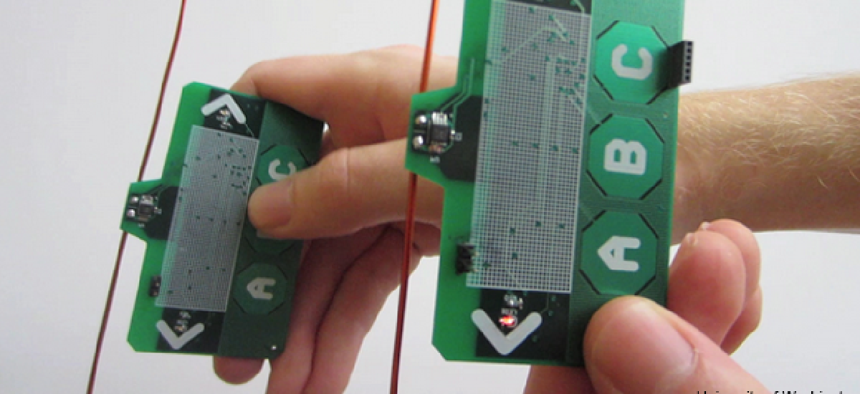Connecting state and local government leaders
Researchers at the University of Washington have developed a way to harvest power from Wi-Fi signals and use that power to communicate with standard Wi-Fi routers.
Whether it’s an office network or the broader expanse of the Internet of Things, one of the biggest challenges – if not THE biggest challenge – in deployment is getting power to the devices. Temperature sensors placed throughout buildings can cut utility bills. Light sensors can trigger streetlights to come on when needed. But the cost of wiring up all those sensors can be prohibitive.
Using batteries to power the devices is in many cases not viable, either. Batteries add to the size of the devices they are powering. And replacing batteries requires expensive manpower on a regular basis.
Looking at the problem, researchers at the University of Washington have developed one solution – devices that harvest power from Wi-Fi signals and use that power to communicate with standard Wi-Fi routers.
The trick, said Bryce Kellogg, doctoral student in electrical engineering and a member of the team developing what they call “Wi-Fi backscatter,” is that the devices can communicate with Wi-Fi routers in a passive way that consumes very little power, so little that the power can be harvested from the received Wi-Fi signal itself.
“The way backscatter works is that you reflect wireless signals instead of transmitting them,” said Kellogg. “You send a bit by either reflecting or not reflecting a signal. Because we’re not broadcasting a signal it is really low-powered. It takes a just a few microwatts of power to switch between states with the antenna.
Even better, the UW team’s backscatter tags are designed to communicate directly with the hardware that already exists in Wi-Fi routers. For each packet it receives from a device, Wi-Fi routers calculate a set of numbers that represent the signal strength between the two devices. More recent routers – those that use the 802.11n and 802.11ac standards – track additional “channel state information” about the status of the signal between the router and each device.
“What we do is we sort of piggyback on top of this,” Kellogg said.
The team’s backscatter tags have a tiny switch and a small antenna that allow it to modulate the signal bounced back to the router to convey data. Once software is installed on the router so that it knows what the patterns of bouncebacks mean, the tag can send data to the router. If the tag is attached to a temperature sensor, for example, the current temperature can be transmitted to the router and, from there, to any device on the network.
“Because existing Wi-Fi routers can pick up the signal strength with Wi-Fi backscatter, all these smart devices could communicate with an existing Wi-Fi router with just a software update,” Kellogg said.
The technology doesn’t support large-scale data transfers, such as streaming movies or talking on a cell phone, which require significantly more power. But it is, according to Kellogg, ideally suited for transmitting sensor data and even limited text messages. A cell phone equipped with a backscatter tag could, for example, send a short text message even if the phone’s battery was dead.
The team’s current version of its backscatter tag has communicated with a Wi-Fi device at rates of 1 kilobit per second with about 2 meters between the devices. They expect to be able to extend that range to about 20 meters. According to Kellogg, that would be done primarily by developing new encoding techniques. “The way in which you encode information makes it easier to pick up at long ranges so you don’t need a really nice, clear signal,” explained Kellogg.
The biggest advantage, of course, is that when those building the Internet of Things deploy hundreds of thousands of sensors in a city, if they equip the sensors with UW’s backscatter tags, they won’t have to send thousands of workers out to replace batteries in a couple of years.
According to Kellogg, the team is exploring plans to form a company to commercialize the devices. At that point, they might even give them a name.
NEXT STORY: University of Maryland opens UAS test site



